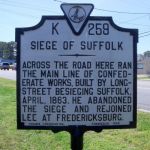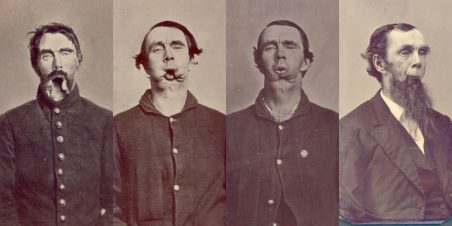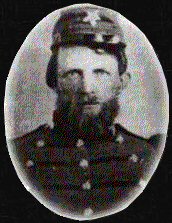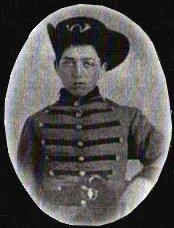Bivouac near Suffolk Apr 25th 63-
Dear Mother-
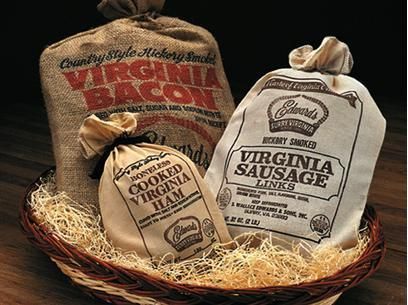
Click image to learn about the significance of Virginia bacon from Suffolk in the the article “Siege of Suffolk Envelops Hampton Roads.”
I reckon you will be surprised to hear that we are at this place now, after forging so much on the Blackwater- we are close enough to see the town but are not at liberty to go in yet awhile- When we first came here I thought our Gens were going to try and take it, but it is now nearly 3 weeks since we came here and nothing done yet, but a little cannonading and very heavy Picket duty to do-
I think now the object of the move is to get the Forage out of this country, for they have most of the Quarter Masters + Comissarys at work now, buying it up and hauling it out – also taking up the Railroad iron on the two roads leading into Town-
It is said they have already got enough bacon to feed the army of Va over 2 months- + at this time that is a considerable item in this little Government of ours-
Our lines are as close as we can get them without fighting, giving the enemy no chance at all to come out by Land without fighting- They have the place forayed fortified to perfection- We have also fortified along our lines- and those made by our Regt form a cross with some made during the old Revolution. Our Pickets are so close to so the enemys redoubts that they can not be relieved in day light being safely ensconced in Rifle Pits and have orders to surrender if the enemy advances in Large numbers- and as sure as they stick their heads up the Yanks will shoot at them. The Pickets being from 3 to 500 yds apart.
They try to shell our reserve picket and whenever they go to load their cannons our boys score away at the Cannoniers- We have only had 3 wounded in our Regt and that was the first day before they had dug any pits- + only one seriously, through the chin, had part of his lower jaw taken out- + I think he will recover-
Our Company has been it the Pits once, but during the night,
It had been raining all day and nearly all night, and you could hear the boys stomping and their teeth chattering at all times of the night, but they had to grin and bear it untill just before day when they were relieved,
I being so fortunate as to be on the a more comfortable post, for this reason- the day before 60 of us were detailed to work on breast works, and had to work from 2 Oclock until 2 at night- and our company being on Picket the next night – our capt sent us with (unreadable) that we might fair a little better-
We arrived at camp next night about 8 Oclock, thinking to have a good nights rest, when Lo and behold 3 days rations of flour on hand to be cooked that night and be ready to have at 3 Oclock. We cooked them and it is now nearly night again and have not moved a pig. Such is the soldiers life-
My paper will not allow much more writing now- Our boys all well except Tom B he has rcd a fur 30 days furlough John Allen has a NC sub in the company now- Jonny Brown has returned and brought the clothing and letters you sent- I would have written by Tom but had no chance. You can let any of the family read this, then burn it. Tell Uncle Newton I would like to get a letter from him. Write whenever you can + I will do the same- Your My Love to all- your devoted and affectionate son
P M Buford
Blogger’s Notes:
-
Parham wrote I think now the object of the move is to get the Forage out of this country. Below excerpt from article Siege of Suffolk Envelops Hampton Roads states the significance of buying it up and hauling it out.
Longstreet remained content to hold his lines and shield his massive foraging effort, leaving Suffolk only after sending millions of pounds of bacon, corn and feed north in a seemingly endless train of wagons.
That made him late for the early May Battle of Chancellorsville, where a badly outnumbered Lee had to rely upon lesser troops in a brilliant if unlikely triumph over the Army of the Potomac.
But when Longstreet finally arrived, he brought the provisions Lee so badly needed to take the war north to Pennsylvania.
“The food from Suffolk is what Lee and his army took to Gettysburg,” former Virginia War Museum director John V. Quarstein says.
“Without it Gettysburg may never have happened.”
- The fortifications built by the 11th Mississippi Regiment in Suffolk, Virginia form a cross with some made during the old (American) Revolution.
- A History of Company G, Eleventh Mississippi Regiment, C.S.A. documents information about individuals referenced in this letter.
-
Thomas (Tom) P. Buford, Parham’s cousin, was present at Seven Pines; was reported sick for several months of catarrh and bronchitis on Blackwater near Suffolk; he was furloughed to Mississippi for 30 days per this letter. Although this will not be the only time he will be furloughed, this one likely saved his life as he was providentially hindered from joining the infantry during Pickett’s Charge at Gettysburg. His health was restored…and he returned to duty near Orange Court-House, in time to be present on 5th and 6th of May, 1864, at the battle of Wilderness. On his last day of this engagement he was shot through the left thigh and sent to hospital at Richmond; from there he was furloughed again. He had so far recovered from this wound as to return…in the trenches near Petersburg, Va. He was present at Jones Farm, Hatcher’s Run, and Hawkes Farm, where he was again wounded, this time in the left knee; was sent to Richmond Hospital, 26th of March, 1865. Gangrene attacked the wound and for weeks and months he was prostrated; was able to travel 1st of June…and (with his brother Warren) reached home July 1, 1865.
- John N. Allen was present at Seven Pines and Gaines’s Farm, and is reported absent sick until he is present again at Jones Farm, October 2, 1864. Parham mentioned John’s North Carolinian substitute in this letter. John’s days were not numbered such to been cut short during the war years. Sickness spared John from several campaigns, including Gettysburg. After the war he was killed in a private difficulty in Mississippi.
-
John (Jonny) F. Brown is mentioned to have returned to camp with clothing and letters from Parham’s mother, He was present at Seven Pines, two days Gaines’s Farm, White Oak Swamp, Malvern Hill, Thoroughfare Gap, Freeman’s Ford, two days at Second Manassas…wounded and captured at Falling Waters, when after an exchange and furlough he was present again at Weldon Railroad two days, Dobbs Ferry, Davis Farm, Jones Farm, Hatcher’s Run, and Hawkes Farm, March 25, 1865.
-
